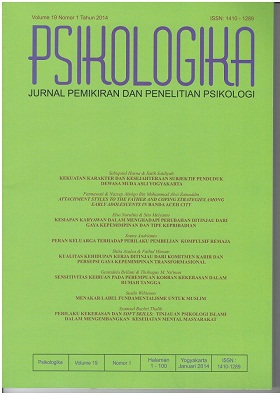Main Article Content
Abstract
This study was developed referring to the negative connotation in using the word “fundamentalism ” and its using as an individual or group label. The method used in this study were literature review using many literatures about Islam and fundamentalism in any perspectives. Based on psychology perspective, it said that fundamentalism is an individual psychological construct associated with beliefs and individual interpretation of something, such as ideology, nationality, and religion. According to this perspective, this study states religious fundamentalism as an individual psychological construct that chacactherized as an interval variable. Nevertheless, the concept of religious fundamentalism among Muslims in the psychology literatures was conceptualized and constructed without consideration to normative doctrine of Islam. In fact, the concept of fundamentalism was born from the tradition of Christian and still polemical in its definition. By using the simple map of the doctrine of Islam, this study concludes that fundamentalism as a psychological constructs can be divided into two dimensions, namely pathological fundamentalism and non-pathological fundamentalism. This is related to the dimensionality of Islam that contains core dimensions (ushuul) and branch dimentions (furuu).
Keywords:fundamentalism, islam, indonesian moslem.
Article Details
Authors who publish with this journal agree to the following terms:
- Authors retain copyright and grant the journal right of first publication with the work simultaneously licensed under a Creative Commons Attribution-ShareAlike 4.0 International License that allows others to share the work with an acknowledgment of the work's authorship and initial publication in this journal.
- Authors are able to enter into separate, additional contractual arrangements for the non-exclusive distribution of the journal's published version of the work (e.g., post it to an institutional repository or publish it in a book), with an acknowledgment of its initial publication in this journal.
- Authors are permitted and encouraged to post their work online (e.g., in institutional repositories or on their website) prior to and during the submission process, as it can lead to productive exchanges, as well as earlier and greater citation of published work (See The Effect of Open Access).




